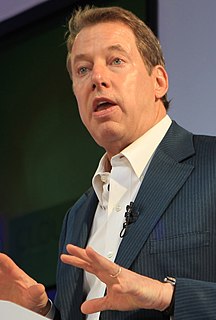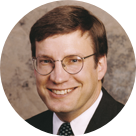A Quote by William Clay Ford, Jr.
I believe very strongly that corporations could and should be a major force for resolving social and environmental concerns in the twenty-first century.
Related Quotes
I believe that capitalism, at least how it's used by major corporations, and environmental concerns are in opposition. To be ecologically aware, productivity of many things would slow down at least for awhile. Stockholders don't want to hear about the saving of the whales or some stream in Kentucky. They want a return on their investment.
Every major federal campaign-finance-reform effort since 1943 has attempted to treat corporations and unions equally. If a limit applied to corporations, it applied to unions; if unions could form PACs, corporations could too; and so on. DISCLOSE is the first major campaign-finance bill that has not taken this approach.
The trends that are shaping the twenty-first-century world embody both promise and peril. Globalization, for example, has lifted hundreds of millions of people out of poverty while contributing to social fragmentation and a massive increase in inequality, not to mention serious environmental damage.
I have very deep concern about the legacy of the Rehnquist court and its efforts to restrict congressional authority to enact legislation by adopting a very narrow view of several provisions of the Constitution, including the commerce clause and the 14th Amendment. This trend, I believe, if continued, would restrict and could even prevent the Congress from addressing major environmental and social issues of the future.
The Social Citizen is the best, most thorough, and most methodologically sophisticated treatment of the role of social networks in political behavior that I have ever read. Betsy Sinclair shows just how strongly we are influenced to express ourselves politically by our family, neighbors, and friends. We are on the verge of a sea change in political science, and this will be one of the most important books we refer to when we describe what happened to the discipline in the twenty-first century.
A popular feel for scientific endeavors should, if possible, be restored given the needs of the twenty-first century. This does not mean that every literature major should take a watered-down physics course or that a corporate lawyer should stay abreast of quantum mechanics. Rather, it means that an appreciation for the methods of science is a useful asset for a responsible citizenry. What science teaches us, very significantly, is the correlation between factual evidence and general theories, something well illustrated in Einstein's life.
It is my belief that whereas the twentieth century has been a century of war and untold suffering, the twenty-first century should be one of peace and dialogue. As the continued advances in information technology make our world a truly global village, I believe there will come a time when war and armed conflict will be considered an outdated and obsolete method of settling differences among nations and communities.
In the early 1970s, Milton Friedman argued that corporations should not be socially responsible because they had no mandate to be; they existed to make money, not to be charitable institutions. But in the economy of the 21st century, corporations cannot be socially responsible, if social responsibility is understood to mean sacrificing profits for the sake of some perceived social good. That's because competition has become so much more intense.
I recall coming across a line by the late Charles Tilly when he said, "The conditions for the possibility of social movements have been called into question in the twenty-first century." And I said to myself, my god, a society in history without social movements, for me, is very difficult to live in.
I think that all countries of the region should join their efforts in the fight against a common threat - terrorism in general and ISIS in particular. It concerns Iran as well, it concerns Saudi Arabia (although the two countries do not get along very well, ISIS threatens both of them), it concerns Jordan, it concerns Turkey (in spite of certain problems regarding the Kurdish issue), and, in my opinion, everybody is interested in resolving the situation. Our task is to join these efforts to fight against a common enemy.
Corporations, consumers, and citizens must begin acting in concert to create a powerful third pillar of social transformation if we hope to meet the social challenges we currently face with equal force. This begins with corporations that choose to alter how they practice capitalism in two ways to serve the greater good.


































